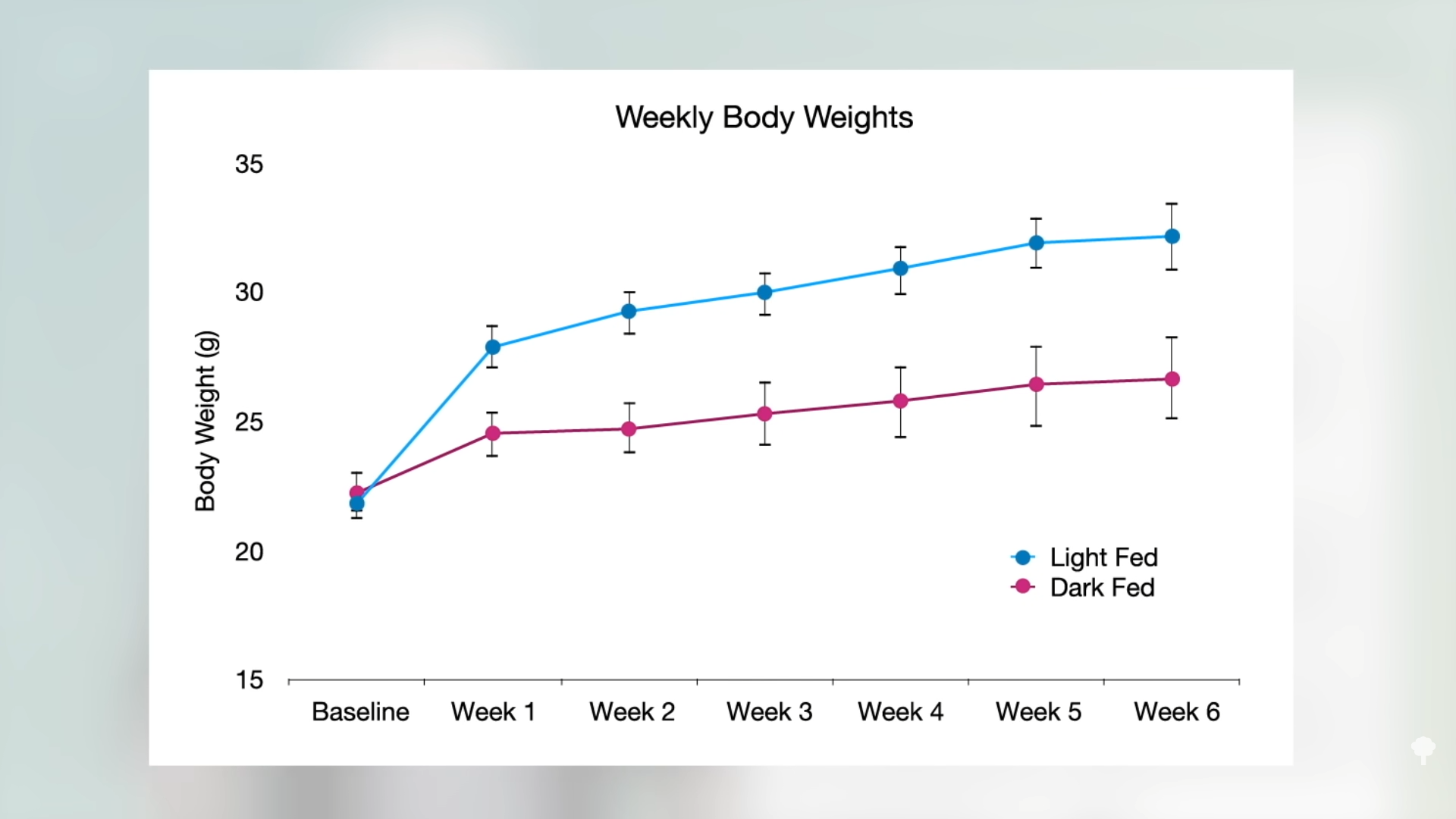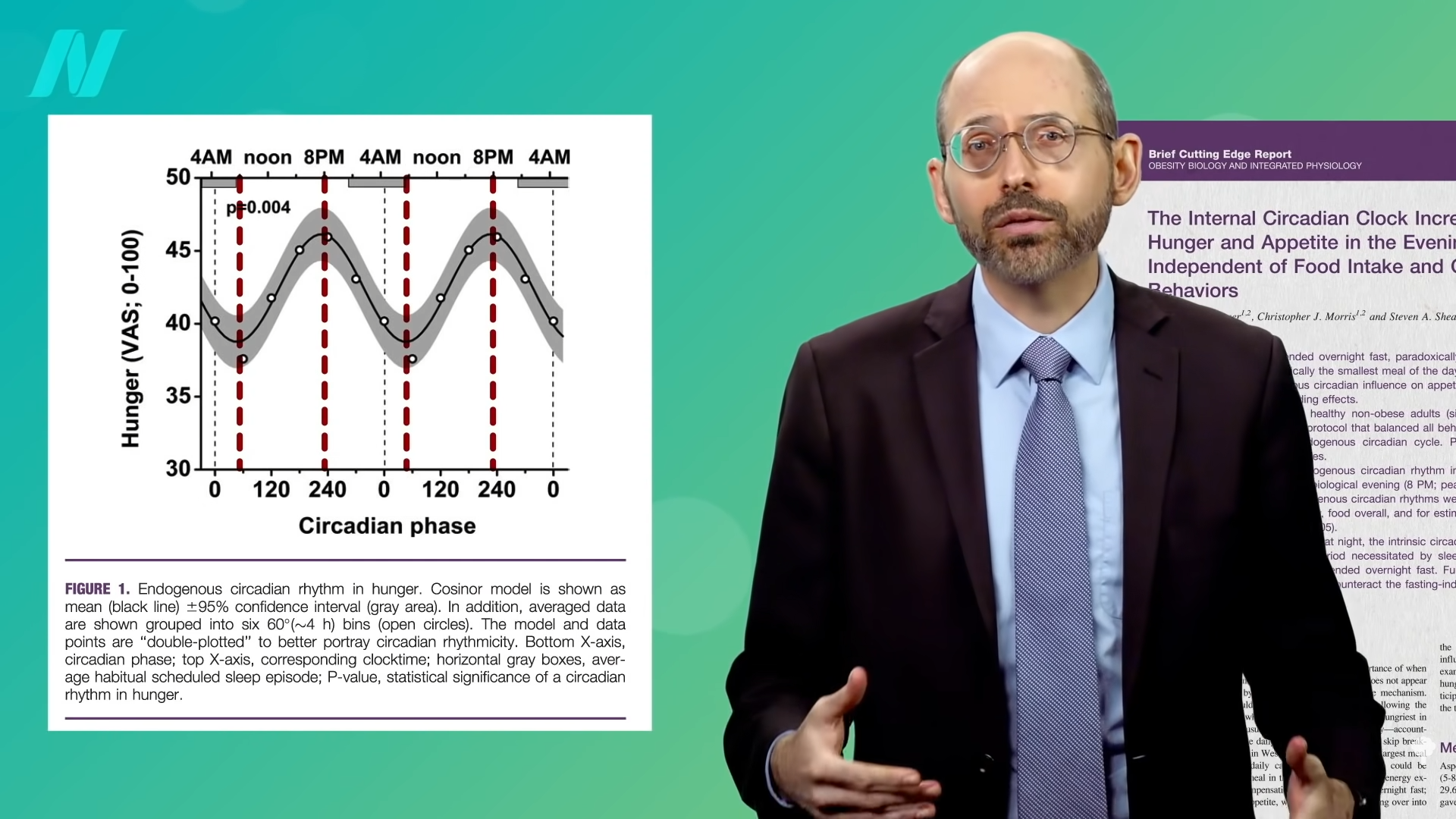[ad_1]
A calorie will not be a calorie. It isn’t solely what you eat, however while you eat.
Mice are nocturnal creatures. They eat through the evening and sleep through the day. Nonetheless, for those who solely feed mice through the day, they achieve extra weight than in the event that they had been fed an identical quantity of energy at evening. Similar meals and about the identical quantity of meals, however totally different weight outcomes, as you possibly can see within the graph under and at 0:18 in my video Eat Extra Energy within the Morning to Lose Weight, suggesting that consuming on the “mistaken” time might result in disproportionate weight achieve. In people, the mistaken time would presumably imply consuming at evening.

Suggestions for weight administration typically embody recommendation to restrict nighttime meals consumption, however this was largely anecdotal till it was first studied experimentally in 2013. Researchers instructed a gaggle of younger males to not eat after 7:00 pm for 2 weeks. In comparison with a management interval throughout which they continued their common habits, they ended up about two kilos lighter after the night-eating restriction. This isn’t stunning, on condition that dietary data present the examine members inadvertently ate fewer energy throughout that point. To see if timing has metabolic results past simply foreclosing consuming alternatives, you’d must power individuals to eat the identical quantity of the identical meals, however at totally different occasions of the day. The U.S. Military stepped ahead to hold out simply such an investigation.
Of their first set of experiments, Military researchers had individuals eat a single meal a day both as breakfast or dinner. The outcomes clearly confirmed the breakfast group misplaced extra weight, as you possibly can see within the graph under and at 1:35 in my video. When examine members ate solely as soon as a day at dinner, their weight didn’t change a lot, however after they ate as soon as a day at breakfast, they misplaced about two kilos per week.

Just like the night-eating restriction examine, that is to be anticipated, given that folks are usually hungrier within the night. Give it some thought. In the event you went 9 hours with out consuming through the day, you’d be famished, however individuals go 9 hours with out consuming in a single day on a regular basis and don’t get up ravenous. There’s a pure circadian rhythm to starvation that peaks round 8:00 pm and drops to its lowest stage round 8:00 am, as you possibly can see within the graph under and at 2:09 in my video. That could be why breakfast is often the smallest meal of the day.

The circadian rhythm of our urge for food isn’t simply behavioral, however organic, too. It’s not simply that we’re hungrier within the night as a result of we’ve been operating round all day. In the event you stayed up all evening and slept all day, you’d nonetheless be hungriest while you awakened that night. To untangle the components, scientists used what’s referred to as a “compelled desynchrony” protocol. Examine members stayed in a room with out home windows in fixed, unchanging, dim gentle and slept in staggered 20-hour cycles to completely scramble them up. This went on for greater than per week, so the topics ended up consuming and sleeping at totally different occasions all through all phases of the day. Then, the researchers might see if cyclical phenomena are really based mostly on inner clocks or only a consequence of what you occur to be doing on the time.
As an illustration, there’s a day by day swing in our core physique temperature, blood strain, hormone manufacturing, digestion, immune exercise, and nearly the whole lot else, however let’s use temperature for example. As you possibly can see within the graph under and at 3:21 in my video, our physique temperature normally bottoms out round 4:00 am, dropping from 98.6°F (37°C) all the way down to extra like 97.6°F (36.4°C). Is that this simply because our physique cools down as we sleep? No. By conserving individuals awake and busy for 24 hours straight, it may be proven experimentally that it occurs at about the identical time it doesn’t matter what. It’s a part of our circadian rhythm, similar to our urge for food. It is smart, then, if you’re solely consuming one meal per day and wish to reduce weight, you’d wish to eat within the morning when your starvation hormones are at their lowest stage. 
Sounds affordable, however it begins to get bizarre.
The Military scientists repeated the experiment, however this time, they’d the members eat precisely 2,000 energy both as breakfast or as dinner, taking urge for food out of the image. The themes weren’t allowed to train both. Similar variety of energy, so the identical change in weight, proper? No. As you possibly can see within the graph under and at 4:18 in my video, the breakfast-only group nonetheless misplaced about two kilos per week in comparison with the dinner-only group. Two kilos of weight reduction consuming the identical variety of energy. That’s why this idea of chronobiology, meal timing—when to eat—is so vital.

Isn’t that wild? Two kilos of weight reduction per week consuming the identical variety of energy! That was a fairly excessive examine, although. What about simply shifting a higher share of energy to earlier within the day? That’s the topic of my subsequent video: Breakfast Like a King, Lunch Like a Prince, Dinner Like a Pauper. First, let’s take a break from chronobiology to have a look at the Advantages of Garlic for Preventing Most cancers and the Frequent Chilly. Then, we’ll resume checking different movies within the associated posts under.
In the event you missed the primary three movies on this prolonged sequence, additionally take a look at associated posts under.
[ad_2]







































Discussion about this post